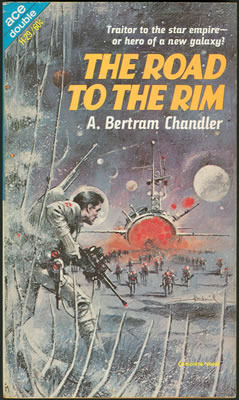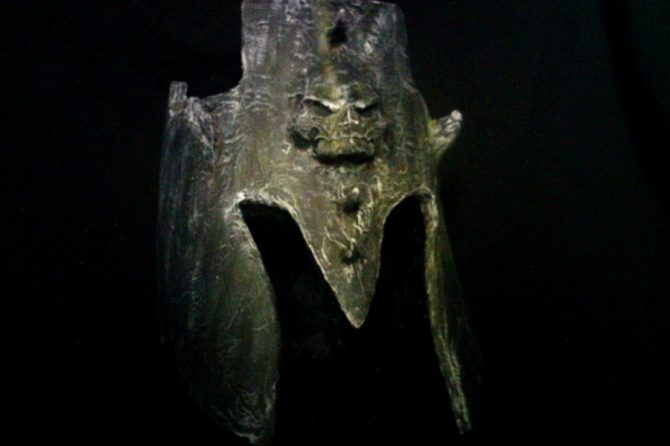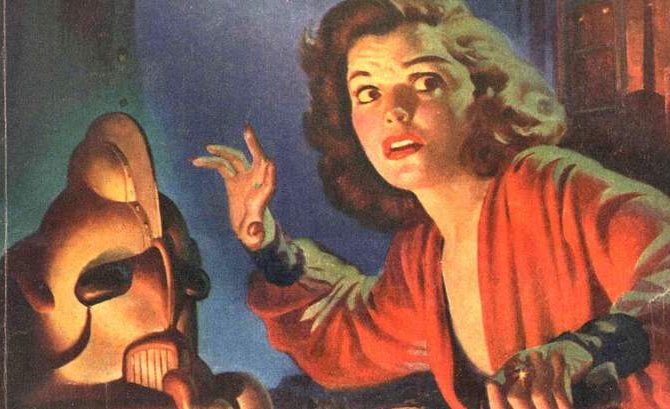
I’m back!
So, where was I? Dealing with mundane problems. I’m separated from my wife and the divorce drags on and on.
On the other hand, I successfully moved from Surrey, B.C. to Nanaimo, B.C. on Vancouver Island as of July 1st. I love my new apartment, and love my new town. Shot in the arm, new lease on life, insert whatever cliché you deem appropriate. Point is I now have the energy to plunge into fanac once more, hence the revival of this column.
What will I write about? Will I renew my reviewing of old fanzines? Yes, and no. Therein lies the subject of my first bit:
DEATH OF A FANNISH ARCHIVE
Bit of an exaggeration that. But I was responsible for the VCON archive, the WCSFA Archive, and the BCSFA archive, the latter containing, among other things, a complete set of BCSFAzines and over 9,000 other fanzines.
The problem I faced was that the opportunity to move into my current abode came at short notice. Worse, there’d be no room for the archive, or even my personal possessions other than a token amount. I had to get rid of hundreds of magazines, books, and most of my furniture. Drastic downsizing required. Every collector’s nightmare. Certainly, every archivist’s nightmare.
In the case of the archive, I threw out all duplicate material and much ephemera, painful though it was. Bear in mind I had no money to send anything anywhere. It was local fen or the dumpster. Fortunately, the local fen came to the rescue.
Felicity Walker (editor of BCSFAzine) and Garth Spencer (winner of the first fannish Aurora Award—known as “The Casper” back in the day) took the bulk of the BCSFAzines and many other zines. Most of the remainder were spread out to numerous other local fen. Jenni Merrifield, President of WCSFA, took over both the WCSFA and the VCON archives. She also took the piles of VCON tape recordings and videos Mr. Science made between 1974 and 1990, keeping them for temporary storage, till someone can be found to take them on. A few items, alas, wound up in the dumpster, but only because mice and rats had ruined them. In general, I can say the archive still exists, albeit dispersed. Sooner or later the items will be passed on, I hope. There’s every good chance things worth preserving will be preserved. Though it pains me the archive is no longer a single collection, I am relieved it still exists, albeit in the hands of others. Very relieved.
Did I keep anything? Yes. I had duplicates of all the BCSFAzines I edited, and those I kept for the sake of nostalgia and as a reminder of personal accomplishment. I also allowed myself to retain a couple of hundred of the oldest and most interesting zines, many of which I have not yet reviewed. You will read about them in future columns, but not just yet. The bulk of my possessions are still in storage and need fumigating (thanks to the rats and mice). It will be a while before I can start reviewing them. In the meantime, I figure I can review current zines.
For this column, however, I’ve elected to grab an Ace Double from the portion of my pocketbook collection on hand and review the two novels therein. Nowadays I figure there’s every likelihood most of my readers will never read such obscure books so I don’t have to worry about spoilers. It IS an opportunity to share some reflections on old-fashioned science fiction which you might find interesting or in some way amusing. Who knows? My review may motivate you to check out other works by the authors. At the very least, a blast from the past for them who cares.
THE ROAD TO THE RIM
by A. Bertram Chandler, published 1967. One side Ace Double H-29

Chandler was quite popular in his time. Born in 1912 in the UK, he began his career as a merchant seaman in 1928, emigrated to Australia in 1956, and rose to the rank of Captain in the Merchant Marine, commanding many a ship till he retired in 1975. He passed away in 1984.
As you might suspect, his life experience permeates his writing. More than two dozen novels and many short stories deal with John Grimes, a spaceman serving in various spaceships both civilian and military in the Outer Rim of our Galaxy which is full of political shenanigans involving competing planets and conglomerations of planetary systems. The spaceships are rather similar to 20th century shipping in terms of organizational structure and crew member points of view, behavioural habits, superstitions, and whatnot. A dead giveaway is this book’s dedication: “For Admiral Lord Hornblower, R.N.” Safe to say Chandler patterned his Grimes series after the Hornblower series (which I read through one summer staying at my Uncle Craig’s lakeside cottage in Nova Scotia when I was about 14 or so). So, good foundations, in my opinion.
Not having read Chandler previously, I was pleased to realize that THE ROAD TO THE RIM, though not the first Grimes tale to be written, marks the beginning of Grimes’ career chronologically, in that he is a commissioned officer of the Federation Space Survey Service, an Ensign no less, newly graduated from the Federation Space Academy. He’s awkward, self-conscious, and very full of himself. When he boards the interstellar transport Delta Orionis its beautiful Purser, Jane Pentecost, makes fun of him, calling him “Admiral,” much to his embarrassment.
Okay, first checkmark. Love interest identified. I didn’t notice his age noted anywhere, but I suspect he’s an older teenager. Consequently, assorted juvenile SF works in mind, I assumed much awkward bantering to come amidst political crisis and violent actions, eventually leading to a maturing of the relationship to the point where they would become an item and “date” (however you do that on a spaceship, or perhaps when you’re on leave in a port). Certainly, there’d be no sex involved. Not in an old-fashioned space opera.
Son of a gun. By page 54 “Somehow the buttons of her uniform shirt had come undone and her nipples were taut against Grimes’ bare chest … He was familiar with female nudity; he was one of the great majority who frequented the naked beaches … What was happening he had read about often enough—and, like most young men, he had seen his share of pornographic films. But this was different. This was happening to him. And for the first time.”
Not your typical Heinlein Juvenile style after all. I knew the mid-sixties had witnessed the intrusion of actual sex into SF more-or-less for the first time, but just in experimental New Wave stuff I thought. A surprise to find it in space opera. But authentic. I’ve heard that sailors tend to think about sex … a lot. Makes sense spacemen would too.
The crewmembers also drink like crazy when off duty and smoke like chimneys whenever they’re conscious. Suspect this accounts for a lot of Merchant Marine shipwrecks. Very adult and realistic to portray spacemen doing the same. Strikes me as remarkable for the time. Could be argued not very science fictiony, no prediction that smokers would eventually become pariahs. Chandler would have been outraged, no doubt. Mind you, surely life aboard a spaceship is more akin to life aboard a submarine, both being enclosed environmental systems, and I would assume no one aboard submarines in the 1960s was allowed to smoke “villainous cigars” or dark pipes while submerged? Then again, perhaps the concept of an air purification system powerful enough to cope with smoking aboard a spacecraft WAS the science fiction prediction element as far as Chandler was concerned. Not to mention water recycling systems capable of coping with drunken vomit. Ah, the wonders of science.
One aspect of the future tech in this book I find annoying is the use of mind readers to keep track of other ships and planets in order to navigate when outside normal space. Still, important to the plot, so okay. I do like the fact that the Psionic Officers are despised by everyone else and have very low status. Seems people don’t believe them when they swear they don’t read other crew member’s or passengers’ minds in their off-duty hours. Plus, people find them creepy. Don’t even like being in the same room with them. I find this psychologically realistic. A nice touch.
What I really like is the Manschenn Drive, the mechanical means of warping the ship through space. “… no man need fear to admit that he was scared by the uncanny complexity of ever-precessing gyroscopes. He stared at the tumbling rotors, the gleaming wheels that seemed always on the verge of vanishing into nothingness, that rolled down the dark dimensions, dragging the ship and all aboard her with them.”
This is poetry of a sort. Dangerous though, as Wolverton, engineer in charge, begins to act a mite peculiar. “Why do you think that I have been tied to my gyroscopes? … I know the drive … It talks to me. It shows me things … but there is no hurry. There is time enough for everything—for everything that is, that has been, that will be and might be.”
In short, the operator of the Mannschenn Drive has become bloody useless. Refuses to obey orders. Refuses to do anything. Grimes and Engineer Wolverton have a bit of a tussle, and Grimes accidentally pushes the demented chap a tad too close to the influence of the gyroscopes tumbling through space and time. “Grimes forced himself to look again at the slimy, bloody obscenity that was a man turned, literally, inside-out—heart (if it was a heart) still beating, intestines still writhing.” Naturally this upsets Captain Craven (great name). After all, now his crew is even more short handed.
Something other than the attitude toward sex is also very mature and adult in the book, namely the politics. Captain Craven warns Grimes that Jane is a provocateur, maybe even a traitor. Jane tells Grimes the Captain can’t be trusted. Evil rebels are at work. Yet everybody in the crew ultimately supports them. And then there are the pirates … the long and the short of it is, there are no good guys or bad guys, everyone thinks their cause is just, that the violence and death and destruction they inflict is justified, or at least practical, and people tend to switch sides according to what they think are their best interests. Just like real life, in other words. No nationalist propaganda at work here! The whole universe is SNAFU. Survive as best you can. A refreshing change from Tom Swift or Tom Corbett hyper patriotism. Very cool.
And getting back to the sex, I expected no-longer-virgin Grimes would get even cozier with Jane. So did he. Trying to contact Craven, he switches on a vid screen to the Captain’s cabin and is treated to a display of “the peculiar luminosity of naked female flesh.” Seems Jane is having a rousing good time with the Captain. Just because Jane had screwed Grimes once didn’t mean she viewed herself as bound to him forever. Besides, maybe she prefers older men. Grimes is shocked but, hey, he had, in his prissy ignorance, assumed too much. Again, realism.
The Captain is a tad annoyed, and later, in private, reams Grimes out even worse than the Mannschenn Drive would have done. “Then, suddenly, the tension was broken and both men collapsed in helpless laughter. In part it was reaction to the strain of battle—but in greater part it was that freemasonry that exists only between members of the same sex, the acknowledgement of shared secrets and shared experiences.”
So, boys will be boys, eh? Sexist as all get out, but spot on for attitudes of the day, and not unknown even now, to put it mildly. Evidently Bertram Chandler is one SF writer who allowed reality to intrude on his fiction. Dated and obsolete today, perhaps, but wonderfully adult compared to the usual sex-doesn’t-even-exist school of thought in most old space opera. Chandler reveals the messy nature of human nature. Appears to take it for granted. Assumes his readers will do the same. Methinks I will seek out more of his work.
Oh, and the kicker is Grimes doesn’t get the girl. They go their separate ways. No role models here. I suspect Chandler just liked grounding ripping good yarns in psychologically accurate aspects of human behaviour. Suspect that is why he was so popular.
THE LOST MILLENNIUM
By Walt and Leigh Richmond, published 1967. The other side of Ace Double H-29.

This husband and wife team wrote six novels in the 1960s and early 1970s, plus a bunch of stories published in Analog. The novels, at least, share a common theme that science is preventing the human race from realising its full potential. What would return us to superman status as a race? Anti-science! This was actually their ruling credo, so much so that they founded something called the Centric Foundation to turn young people on to pseudo-science as an alternative to evil orthodox science.
The opening chapter consists of one character lecturing another that history is myth and myth is history, and the first modern chap to understand this and open up the true vistas of the past was Velikovsky. I nearly fell off my chair. I remember that literal-minded twit. He took the bible as evidence of spaceships, nuclear catastrophes, transmitted electrical power, anti-gravity flying machines, all of it backed up by the combined mythologies of other ancient cultures. I vaguely recall he had the planets of the Solar System in a game of billiards knocking each other out of position. Astronomer Carl Sagan led the charge against the deluded crank and got heavy flack for daring to promote science over idiotic wishful thinking. I almost stopped reading then and there.
However, I slogged on ahead for a while. The book flashes back to our lost paradise and describes the (ultimately fatal) attempt to “tap into the electrical current that exists as a potential between the Earth ground and the ionosphere.” There is the unfortunate risk of precipitating a continuous avalanche of power that would cause the electric motor of the planet to speed up till “eventually the Earth would explode from centrifugal stress.” Sounds dangerous, but the highly advanced civilization of Atlantis decides to go ahead anyway. A little touched by hubris methinks.
I was sort of willing to continue by interpreting the Velikovsky nonsense as a homage to big concept thinking of the 1930s, but what finally did me in was the utter lack of imaginative thinking in portraying the life style of people thousands of years ago. For example, the main character ashamed of showing up at a nightclub with only grey pants and a white shirt in contrast to his date dressed in green silk slacks and a soft, white silk shirt with a gold vest. His friends crammed into a booth at the nightclub, finding it difficult to talk above the music while watching the in-crowd “dancing the new stay-apart, jump-up-and-downs.” Gosh, this glimpse of the superior race of man on a binge is just awash with brilliant futurism (or pasterism, or whatever). Fact is, I was bored to tears.
I’m 67. I’m no longer a completist. I only have a few years left and I’m not going to waste them reading the works of the Richmonds. Wouldn’t mind at all reading more Chandler, though.
BY THE WAY:
You can find a fantastic collection of zines at: Efanzines
You can find yet more zines at: Fanac Fan History Project
You can find a quite good selection of Canadian zines at: Canadian SF Fanzine Archive
And check out my website devoted to my OBIR Magazine, which is entirely devoted to reviews of Canadian Speculative Fiction. Found at OBIR Magazine
And then check out my newest new website, devoted to my paying market SF&F fiction semi-pro zine Polar Borealis, at Polar Borealis Magazine










